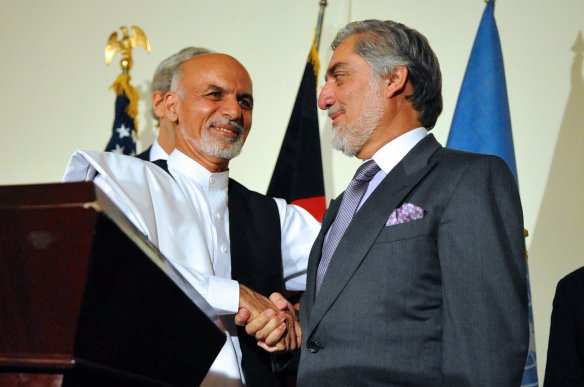
Afghan presidential candidates at the time, Ashraf Ghani and Abdullah Abdullah shaking hands after both addressed reporters at the United Nations Mission Headquarters in Kabul, Afghanistan on July 12, 2014. Photo: U.S. Department of State (Wikimedia).
Sitting in Kabul today, watching the Presidential inauguration on local television, it is difficult to say whether we are seeing a new Afghan spring or the onset of a disaster.
After weeks and weeks of quarrelling, the two main presidential contenders settled on a power-sharing formula: Ashraf Ghani is the new president, while Abdullah Abdullah takes up a newly established Prime Minister post. The latter also demanded a more prominent role during the inauguration, however, which led to a hot debate over the inaugural liturgy during the last few days. In fear of Abdullah abstaining, many sighed with relief when he finally appeared on stage. But in the end, the inauguration was Ghani’s ceremony. As the newly sworn in president, he delivered a lengthy and ambitious address that poked a finger at many of those present.
President Ghani made a point out of speaking to the common Afghan citizen, to the country’s youth, and its women. It was duly noted that the new first lady, Rula Ghani, was sitting on the second row, a signal underlined by Ghani’s reference to her being a public figure, championing the causes of youth and the displaced. This left no doubt about the President’s commitment to women’s empowerment. Central in his address was also the war against corruption, which inevitably will target many currently in leading positions. Moreover, his message was that all political as well as administrative appointments should be based on merit. This principle is challenged by his own choice of former militia commander and warlord Rashid Dostum for 1st vice president, however. Dostum brought a strong vote bank to Ghani’s campaign, but can hardly be said to have been selected on the basis of a commitment to a good governance agenda. Ghani also advocated the dismantling of illegal armed groups, an implicit admission that the recent conflict over power-sharing has revealed that military force still plays a major role in Afghan politics.
Already in 1991, I saw a version of the program that Ghani laid out today. At the time I was leading the country office of the Norwegian Afghanistan Committee (NAC), and in preparation for an expected regime change, we hosted a large seminar on Afghanistan’s reconstruction. Slated to be the keynote speaker, Ghani unfortunately had to pull out at the last minute, but he had already sent me his manuscript. In essence, his speech presented a comprehensive program for how to build a functioning Afghan state which could deliver basic welfare to its citizens while securing economic growth. An impressive program, it was also very much the vision of a technocrat. I promised Ghani not to distribute his manuscript, a promise I have kept. But what I can say, is that what he laid out today is very much in tune with the paper I read some 23 years ago. What has changed is that he has learned quite a few tough lessons about Afghan politics, and while his program is pursuing the principled vision of a seasoned technocrat, it also seeks to recognize that bringing about sustained reform of the Afghan polity is only possible if one selects which battles to take and when to take them.
Will Ghani succeed with his ambitious reform program? Will the new Government of Peace and Unity prove sustainable? The starting point does not bode well: a thoroughly compromised presidential election, marred by massive fraud, concluded with a creative twisting of constitutional principles, ultimately a blow to the credibility of democracy in Afghanistan. Yet, the vision of a government of national unity has been there since the 1980s. And while Taliban is still outside the political tent, the new division of labor between Ghani and Abdullah could, if it works, be exactly what is needed for Afghanistan to move on. The challenges ahead are tall. Ministerial appointments will be contested. Any attempt to clean up the government administration will be conflictual. Shifting power within the security apparatus will trigger tensions, as will any attempt to dismantle the military capacity of various warlords. Neighborly interference will have to be stemmed. Continued international support, after the international military withdrawal, will need to be secured. Nevertheless, in all of this, the ability to formulate a consistent political vision, with clear implications for practical policy, is a good platform. Ultimately, it is the ability of Ghani, with Abdullah, to maneuver Afghanistan’s complex political landscape that will decide whether or not what we see today is the onset of a new Afghan spring.